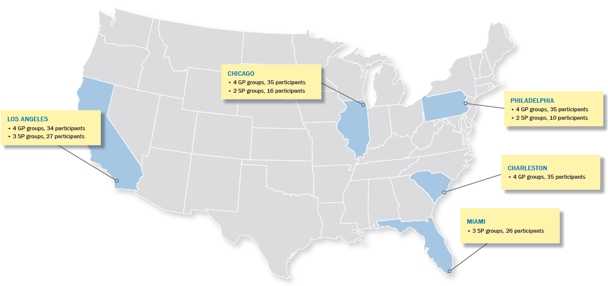Poster Presentation: Why Should I Get Screened for Colorectal Cancer?
Cynthia A. Gelb, BSJ,a Jennifer Chu, MPH,b and Lauren Grella, MAb
aDivision of Cancer Prevention and Control, Centers for Disease Control and Prevention, Atlanta, GA
bOgilvy Washington, Washington, DC
This poster [PDF-3.7MB] was presented at the National Conference on Health Communication, Marketing, and Media in Atlanta, Georgia on August 21, 2013.
Background

Of cancers affecting both men and women, colorectal cancer is the second leading cancer killer in the United States, even though it is largely preventable. Screening, beginning at age 50, helps prevent colorectal cancer or find it early, when treatment works best. Still, about 40% of Americans have not been screened as recommended. CDC’s Screen for Life: National Colorectal Cancer Action Campaign (SFL) educates men and women about the importance of colorectal cancer screening by creating and disseminating public service announcements (PSAs) and patient education materials, and working with state and tribal health departments to promote colorectal cancer screening.
Research
SFL material development is informed by substantial audience research. In 2010, SFL conducted focus groups in Philadelphia, Los Angeles, Chicago, Miami, and Charleston, to assess knowledge, attitudes, and behaviors related to colorectal cancer and screening, and to test PSA creative concepts. In total, 139 men and women participated in English-language/general population focus groups; 79 men and women participated in Spanish-language focus groups. Participants were either close to age 50, when screening is recommended to begin for those at average risk for the disease, or they were aged 50–75.

- In Los Angeles, 37 people participated in four English focus groups, and 27 people participated in three Spanish focus groups.
- In Chicago, 35 people participated in four English focus groups, and 15 people participated in two Spanish focus groups.
- In Philadelphia, 35 people participated in four English focus groups, and 10 people participated in two Spanish focus groups.
- In Charleston, 35 people participated in four English focus groups.
- In Miami, 26 people participated in three Spanish focus groups.
While most participants expressed awareness about colorectal cancer in general, and were familiar with colonoscopy as a screening test, they were less knowledgeable about other recommended screening options and who should be screened. Common reasons they stated for avoiding screening included—
- Having no symptoms.
- Having no family history.
- Believing they were too young for screening.
- Being reluctant to have a colonoscopy because of the perceived invasiveness and discomfort associated with it.
Concepts that clearly communicated facts about screening and directly addressed misconceptions were most appealing to focus groups participants, who also expressed appreciation for including racially and ethnically diverse people in the creative concepts.
PSA Development and Distribution

Kiosk at Southland Mall in Miami, Florida
These findings led SFL to produce “No Excuses” (“No Hay Excusas” in Spanish) TV and print PSAs. They feature diverse men and women stating misconceptions and excuses for why they have not been screened, along with the facts correcting these misconceptions.
“... One thing that did pop in my mind that made me want to say, oh maybe I’d better go and get checked, is that the symptoms don’t always show. That made me say, okay [I need to get screened].” (Los Angeles participant)
FACT: Colorectal cancer doesn’t always cause symptoms, especially early on.
“I didn't know that most colorectal cancer occurred in people that didn’t have a family history...” (Philadelphia participant)
FACT: Most colorectal cancers occur in people with no family history.
“The message is clear: have the exam done and it says there are different exams, which I only knew of one. Apparently there are others that are not as invasive... so interesting.” (Miami participant)
FACT: There are several kinds of screening tests for colorectal cancer.
“Really I don’t have any excuse. I am over 50 and I need to take responsibility for my health.” (Chicago participant)
FACT: Screening is recommended for men and women beginning at age 50.

Diorama at Hartsfield-Jackson International Airport in Atlanta, Georgia
The “No Excuses” and “No Hay Excusas” TV PSAs were first distributed in March 2012. Postcards and posters adapted from the PSAs were made available through the SFL Web site. In December 2012, specially adapted “No Excuses” and “No Hay Excusas” PSAs were distributed in targeted U.S. cities for display in airports, shopping malls, and transit stations, as well as on TV monitors in elevators in public buildings.
Evaluation Methods and Results
SFL TV PSAs are tracked by Nielsen, providing CDC with data on how often, when, and where the PSAs are broadcast; audience impressions (number of times PSAs are seen or heard); and donated ad value. Print PSAs are tracked using a clipping service, providing publication names, markets, impressions, and equivalent ad value.
As of May 31, 2013, “No Excuses” and “No Hay Excusas” PSAs in all media have generated more than 1.18 billion impressions worth $21 million in donated ad value.
Conclusions
Since SFL was launched in 1999, consumer knowledge and attitudes about colorectal cancer screening have shifted. Screening rates have increased significantly (from 45% of men and 41% of women screened according to guidelines in 2000, to about 63% in 2010). However, misconceptions about colorectal cancer and screening still exist. Addressing misconceptions in educational materials may encourage more people to be screened as recommended.
Implications for Research and/or Practice
Misconceptions about colorectal cancer screening prevent many people from being screened according to guidelines. Recognizing these common misconceptions and addressing them in a direct manner can effectively promote appropriate screening for this highly preventable cancer.
- Page last reviewed: February 27, 2014
- Page last updated: September 16, 2013
- Content source:


 ShareCompartir
ShareCompartir